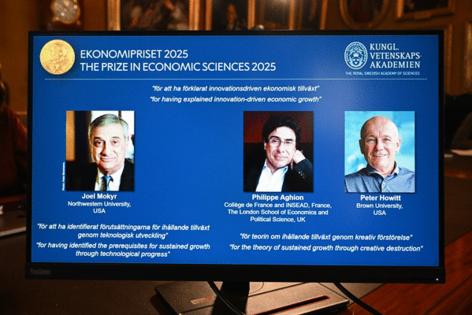Editorial: A Nobel Prize for the economics of progress
Published in Op Eds
This year’s Nobel Prize for economics is unusually pertinent. It honors three scholars who, in different ways, have tried to understand why innovation happens and how it promotes economic growth. These questions have never seemed more pressing.
Technological progress shows no sign of stalling. Quite the opposite: Artificial intelligence promises a new surge of “creative destruction,” meaning higher living standards combined with upheaval in the labor market. Making the most of this prospect is challenging in its own right, but it also exemplifies a deeper puzzle. In recent years, advancing knowledge, new goods and services, and new forms of production have arrived alongside sluggish growth in productivity.
Hence the puzzle: Exactly how does technological progress drive prosperity, and why isn’t faster growth already here? Laureates Joel Mokyr of Northwestern University, Philippe Aghion of the London School of Economics and Insead in Paris, and Peter Howitt of Brown University have shed light on these hugely consequential mysteries.
Mokyr is an economic historian who studies episodes of scientific and technological advancement, in particular the knowledge revolution of the late 18th and early 19th centuries. The key point is that discoveries, while essential, aren’t enough. They have to interact with a supporting cultural and commercial environment that recognizes and applies them. Success requires a compound of scientific knowledge, practical competence and appetite for material progress. History shows that none of those can be taken for granted.
The focus of Aghion’s and Hewitt’s work is more squarely on creative destruction, the term coined by Joseph Schumpeter in 1942. The idea acknowledges the downside of innovation: New products dislodge old ones, established firms decline and new ones take their place, and many workers find their skills no longer in demand.
Crucially, these shifts are part and parcel of economic growth. Rather than errors to be avoided, they’re costs to be moderated with judicious public policy, including effective social insurance, better education and training, and attention to economic opportunity. Spur innovation by attending to incentives, supporting R&D and bolstering competition. That’s vital for growth. But be under no illusion: Progress can’t be painless.
Growth through innovation is the only way to keep living standards rising — and rising faster, given the right policies. Growth, and only growth, provides the means to address chronic poverty, vulnerability to disease, climate change and other global threats. Give the prize committee credit for recognizing the centrality of these questions and honoring scholars devoted to finding answers.
_____
The Editorial Board publishes the views of the editors across a range of national and global affairs.
_____
©2025 Bloomberg L.P. Visit bloomberg.com/opinion. Distributed by Tribune Content Agency, LLC.
























































Comments